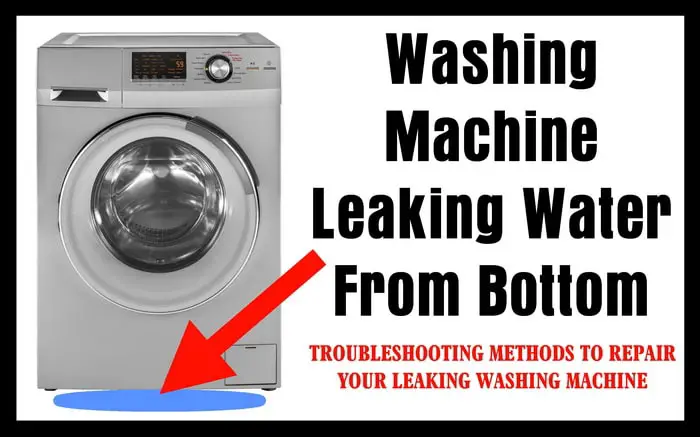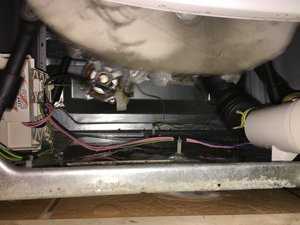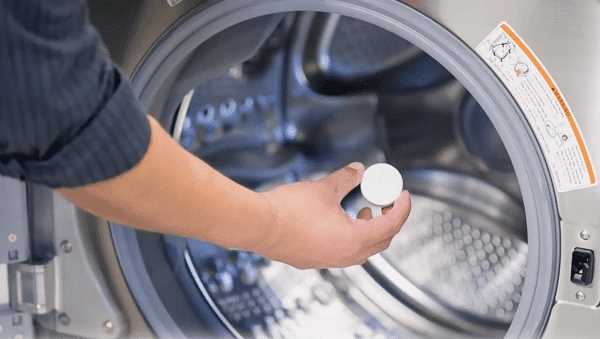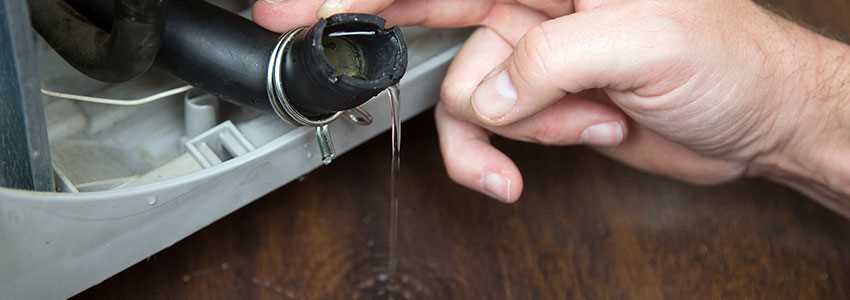




If you’ve noticed water pooling around your washing machine, there’s a good chance that it’s leaking from the drum. This can be a frustrating problem to deal with, as it not only creates a mess but can also cause damage to your floors and surrounding areas. Understanding the common reasons for this issue can help you troubleshoot and resolve the problem.
One of the most common reasons for a leaking washing machine drum is a damaged or worn-out door seal. Over time, the seal can become brittle and develop cracks or tears, allowing water to escape during the wash cycle. Inspect the seal for any signs of damage, such as visible tears or areas where it is no longer tightly sealed against the drum. If you notice any issues, replacing the seal should solve the problem.
Another possible cause of a leaking drum is a blocked or clogged drainage system. If the water cannot properly drain from the drum, it can overflow and leak onto the floor. Check the drainage hose and the drain pump filter for any obstructions, such as lint or debris. Cleaning out these areas can often resolve the issue and prevent further leaks.
In some cases, the problem may be due to an issue with the water inlet valve. This valve controls the flow of water into the washing machine, and if it is faulty or damaged, it can cause leaks from the drum. Inspect the valve for any signs of leakage or damage. If necessary, replace the valve to fix the problem.
It’s worth noting that overloading the washing machine can also lead to leaks from the drum. When the machine is packed with too many clothes, it can put excessive strain on the drum and cause it to leak. Make sure to follow the manufacturer’s guidelines regarding load capacity, and avoid overloading the machine to prevent leaks.
In conclusion, a leaking washing machine drum can be caused by various reasons, including a damaged door seal, a clogged drainage system, a faulty water inlet valve, or overloading the machine. By identifying the cause of the leakage and taking the appropriate steps to address it, you can ensure that your washing machine operates efficiently and without any leaks.
Common Reasons for Washing Machine Drum Leaks
A leaking washing machine drum can be a frustrating problem to deal with. Not only can it create a mess, but it can also lead to damage to your floors and even mold and mildew growth. Understanding the common reasons for washing machine drum leaks can help you identify and address the issue effectively.
1. Damaged Door Seal
One of the most common causes of washing machine drum leaks is a damaged door seal. Over time, the seal can become worn or cracked, allowing water to escape during the wash cycle. Inspect the door seal for any signs of damage, such as tears or gaps, and replace it if necessary.
2. Loose or Worn Drum Gasket
The drum gasket, also known as a door boot seal, is another component that can cause leaks. If the gasket is loose or worn, water can leak out during operation. Check the gasket for any signs of wear or damage and tighten or replace it if needed.
3. Blocked Drain Pump Filter
A blocked drain pump filter can also cause water to leak from the drum. When the filter is clogged with debris, it can lead to drainage issues and result in water overflowing and leaking from the machine. Clean the filter regularly to prevent blockages.
4. Cracked Drum or Tub

A cracked drum or tub can cause significant leaks during the wash cycle. Inspect the drum and tub for any cracks or damage and replace them if necessary. This is a more serious issue that may require professional repair or replacement.
5. Loose or Damaged Hoses
Loose or damaged hoses can also be responsible for leaks. Check all the hoses connected to your washing machine, including the inlet and drain hoses, for any signs of damage or looseness. Tighten or replace the hoses as needed.
6. Excessive Detergent Use
Using too much detergent can create excessive suds, leading to leaks from the drum. Follow the manufacturer’s guidelines for detergent usage and avoid overloading the machine. Additionally, make sure to use high-efficiency (HE) detergents designed for use in modern washing machines.
7. Unbalanced Load

An unbalanced load can cause your washing machine to become unstable during the spin cycle, leading to leaks. Make sure to properly distribute the load inside the drum and avoid overloading the machine. If you consistently experience leaking during the spin cycle, try rearranging the load.
8. Faulty Water Inlet Valve
A faulty water inlet valve can cause leaks by not properly controlling the water flow into the machine. If you notice water leaking from the drum even when the machine is not in use, or if the drum continues to fill with water even when the cycle is finished, the water inlet valve may be the culprit. Consider replacing the valve to resolve the issue.
In conclusion, several factors can contribute to drum leaks in a washing machine. Regularly inspecting and maintaining the door seal, drum gasket, hoses, and other components can help prevent leaks and ensure your machine operates effectively.
Damaged Door Seal
The door seal is an important component of a washing machine, as it ensures that water stays inside the drum during the wash cycle. If the door seal becomes damaged, it can lead to leaks from the drum. Here are some common reasons why the door seal may become damaged:
- Aging: Over time, the door seal can wear out and become less effective at sealing the drum.
- Physical damage: The door seal can get torn or damaged due to mishandling or accidental impact.
- Buildup of dirt and debris: If the door seal isn’t cleaned regularly, dirt and debris can accumulate on the seal and cause it to deteriorate.
If you suspect that the door seal is causing the leakage, here are some steps you can take to address the issue:
- Inspect the door seal: Check the door seal for any visible signs of damage, such as cracks or tears. If you notice any damage, the seal may need to be replaced.
- Clean the door seal: Remove any dirt or debris from the door seal using a cloth and mild detergent. Be gentle to avoid causing further damage.
- Replace the door seal: If the door seal is severely damaged or worn out, it may need to be replaced. Consult the washing machine’s manual or contact a professional for assistance with replacing the seal.
Remember to always unplug the washing machine before inspecting or repairing any parts to ensure safety. Taking proper care of the door seal can help prevent leaks and extend the lifespan of your washing machine.
Overloaded Machine
An overloaded washing machine is a common reason for leaks from the drum. When you put too many clothes into the machine, it can become unbalanced during the spin cycle. This imbalance can cause excessive movement of the drum, which can result in water being spilled out of the machine.
Causes of Overloading:
- Trying to wash too many clothes at once.
- Not following the manufacturer’s recommended load capacity.
Effects of Overloading:
When a washing machine is overloaded, it can lead to:
- Excessive vibration and movement during the spin cycle, which can damage the machine and the surrounding area.
- Increased wear and tear on the drum and other components, leading to potential leaks.
- Poor washing performance, as clothes may not be properly agitated or rinsed.
Prevention:
To prevent overloading your washing machine and avoid leaks from the drum, follow these tips:
- Read the manufacturer’s instructions and adhere to the recommended load capacity.
- Sort your laundry properly to ensure you don’t exceed the machine’s capacity.
- If you have a large amount of laundry to wash, consider doing multiple smaller loads instead of one big load.
- Regularly check the balance of your washing machine to ensure it is level. Adjust the feet if necessary.
In summary, overloading your washing machine can lead to leaks from the drum due to excessive movement and imbalance. It is important to follow the manufacturer’s guidelines for load capacity and take steps to prevent overloading the machine.
Clogged Drain Pump Filter
A clogged drain pump filter is one of the common reasons why your washing machine may be leaking from the drum. The drain pump filter is responsible for trapping any debris or lint that may accumulate during the wash cycle. Over time, this filter can become clogged, preventing proper drainage and causing water to leak from the drum.
Here are some signs that your drain pump filter may be clogged:
- Water leaking from the drum during or after the wash cycle
- Longer than usual water drainage time
- Foul odor coming from the washing machine
To check if the drain pump filter is clogged, you’ll need to locate it. The location of the drain pump filter varies depending on the make and model of your washing machine. However, it is typically located at the front or bottom of the machine.
Once you’ve located the drain pump filter, follow these steps to clean it:
- Unplug the washing machine from the power source to ensure your safety.
- Place a towel or bucket underneath the filter to catch any water that may spill out.
- Using a screwdriver or a coin, unscrew the filter cover. Be cautious as water may start to flow out.
- Gently remove the filter and rinse it under running water to remove any debris or lint.
- Inspect the filter for any damage or cracks. If it is damaged, replace it with a new one.
- Reinsert the filter and screw the cover back on.
After cleaning the drain pump filter, run a test cycle to ensure that the leaking issue has been resolved. If the problem persists, it is recommended to consult a professional technician.
Excessive Detergent Usage

One common reason why your washing machine may be leaking from the drum is due to excessive detergent usage. Using too much detergent can cause an overflow during the washing cycle, leading to water leaking from the drum.
When you use more detergent than necessary, it creates excessive suds that can be difficult to rinse out completely. These suds can accumulate inside the machine and create a barrier, preventing the water from draining properly. As a result, the water may overflow and leak from the drum.
To avoid this issue, it is important to follow the manufacturer’s instructions for detergent usage. Typically, using the recommended amount of detergent based on the load size and level of dirtiness should be sufficient. It is also important to choose the right type of detergent for your washing machine.
If you notice that your washing machine is leaking due to excessive detergent usage, there are a few steps you can take to resolve the issue:
- Stop the washing machine: If you notice the leak during a washing cycle, stop the machine immediately to prevent further water damage.
- Clean up the excess water: Use towels or mop to soak up any water that may have leaked onto the floor.
- Reduce the amount of detergent: Adjust the amount of detergent you use for each load, making sure to measure it accurately based on the load and detergent instructions.
- Rinse the machine: Run a cycle with no clothes and no detergent to rinse out any excess soap residue from the machine. This will help prevent suds from accumulating and causing leaks in the future.
- Check for other issues: If the problem persists, there may be other underlying issues causing the leak. In this case, it is advisable to contact a professional technician to inspect and repair the washing machine.
By using the right amount of detergent and ensuring proper rinsing, you can prevent leaks caused by excessive detergent usage and prolong the life of your washing machine.
Loose or Faulty Hose Connections

- Overview:
- Causes:
- Loose connections due to improper installation.
- Worn-out or damaged hose connectors.
- Loose or worn-out hose clamps.
- Solutions:
- Check for loose connections: Inspect the hose connections at the back of your washing machine and ensure they are tightly secured. If any connections are loose, tighten them using a wrench or pliers.
- Replace worn-out hose connectors: If the hose connectors are worn out or damaged, they should be replaced. You can find replacement connectors at your local hardware store or online. Follow the manufacturer’s instructions for installing the new connectors.
- Tighten or replace hose clamps: Hose clamps are used to secure the hoses to the connectors. If the clamps are loose or worn out, tighten them using a screwdriver or replace them with new ones. Make sure the clamps are tightened properly to prevent leaks.
- Prevention:
- Proper installation: When installing your washing machine, carefully follow the manufacturer’s instructions to ensure all hose connections are properly installed.
- Regular maintenance: Regularly inspect your washing machine’s hose connections for any signs of wear or damage. Replace any worn-out parts promptly.
- Proper tightening: When tightening hose connections or clamps, avoid overtightening as it can cause damage. Follow the manufacturer’s recommended tightening instructions to ensure a secure connection without damaging the components.
If your washing machine is leaking from the drum, one of the most common reasons could be loose or faulty hose connections. These connections play a crucial role in the proper functioning of your washing machine and any issues with them can result in leaks.
There are several possible causes for loose or faulty hose connections:
Here are some steps to help you fix loose or faulty hose connections:
To prevent future issues with hose connections, consider the following prevention measures:
FAQ
Why is water leaking from my washing machine?
There are several common reasons why your washing machine may be leaking from the drum. These include a faulty door seal, a clogged drain hose, a cracked tub, or a worn-out water inlet valve. It is important to identify the exact cause of the leak in order to fix it properly.
How can I check if the door seal is faulty?
To check if the door seal is faulty, you can visually inspect it for any signs of wear, cracks, or damage. You can also try running a small amount of water into the drum and see if it leaks from the door area. If the door seal is indeed faulty, it will need to be replaced to fix the leak.
What should I do if the drain hose is clogged?
If you suspect that the drain hose is clogged, you can try removing it and checking for any blockages. If you find any debris or buildup, you can clean it out using a long flexible brush or by running water through it. If the drain hose is severely clogged or damaged, it may need to be replaced.
How can I tell if the tub is cracked?
To determine if the tub is cracked, you can carefully inspect it for any visible cracks or damage. You can also try running a small amount of water into the drum and see if it leaks from the bottom. If there is indeed a crack in the tub, it will need to be repaired or replaced to stop the leakage.
What should I do if the water inlet valve is worn out?
If you suspect that the water inlet valve is worn out, you can visually inspect it for any signs of wear or damage. You can also try running a small amount of water into the drum and see if it leaks from the valve. If the water inlet valve is indeed worn out, it will need to be replaced to fix the leak.
Why is my washing machine leaking water from the drum?
There can be several reasons why your washing machine is leaking water from the drum. One possible reason is a damaged or worn-out door seal. The door seal is responsible for creating a watertight seal when the door is closed, and if it is damaged or worn out, water can leak from the drum. Another possible reason is a blocked or faulty drain hose. If the drain hose is blocked, water may not be properly drained from the machine, leading to leakage. Additionally, a damaged or loose inlet valve can also cause water to leak from the drum.













